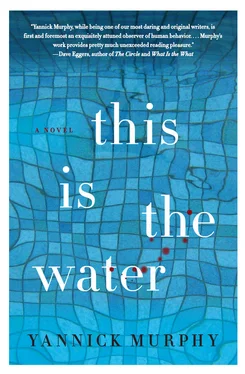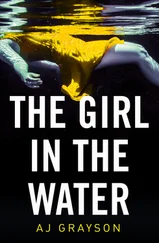Mandy, who of course doesn’t even go to the meets, likes the away facility too, since it means she doesn’t have to clean up after hundreds of people who come for the home meet and stop up the toilets with their constant flushing and get the locker room floor sopping wet. Dinah has already compared the two pools, and has learned from her research that the away pool is a slower pool than the home pool. The away pool’s gutters are deeper, making more turbulence, creating more resistance against the swimmers’ bodies, and slowing down their times. The home pool also keeps its lane lines tighter so that it’s less likely a lane line will float into swimmers and cause them to jam their hands into one of the hard plastic cuffs. At practice, Dinah lets everyone know what she’s learned. She suggests all the parents sign a petition so that the coaches know they all want to swim at the home pool. You don’t want to sign it. You figure the coaches have their own reasons for voting where States should be swam, and you don’t want to get involved. “You just like staying at the hotels and staying up late talking to other women’s husbands — that’s why you want it to be away,” Dinah says to you in front of some of the other parents, trying to sound as if she’s joking. Thankfully Chris isn’t at this practice.
We kill because we hear voices that tell us to kill. We kill because we feel we are on a mission to rid the world of a certain type of person. We kill for lust, for sexual motivation. We kill for the thrill of killing. We kill for power and to have total control over someone else’s fate. We kill to gain money. (The killer, our killer, laughs. He has checked the wallets and the pockets of the women he’s killed, and there has been hardly enough money to replace the clothes he was wearing at the scene of the crime.) Once we kill, we can keep killing, or we can stop killing. We can kill again after years of not having killed. We can go on a spree. We can do all of our killing in two weeks or less. We can kill all of our lives. We can have had parents who were divorced, or parents who pecked each other on the cheek every time one walked in the door, and said “I love you” multiple times throughout the day.
You never know how many we really killed. You can blame us for three or four, but you never really know.
Our killer minimizes the screen on the computer. A teacher has come into his office to use his fax machine. “Hey, Floyd,” the teacher says while she’s feeding in the document. “I came in early this morning and heard coyotes howling at the edge of the woods near the playground. I think we’d better let the other teachers know not to let kids play too close to the woods during recess.”
“Coyotes?” Floyd says. “Do you know how many coyotes actually attack people throughout the year? It’s about one person, in the entire United States, every ten years. I think the poison ivy by the stream is more of a hazard than the coyotes.”
“You didn’t hear? We’re getting sheep to eat the poison ivy,” the teacher says.
“Sheep?”
“They love it. We pen them in and they eat it. The only thing is, the kids can’t pet the sheep, or they may get the poison ivy.”
Floyd laughs. “I wouldn’t have thought of sheep.”
After the teacher leaves the room, Floyd doesn’t have time to go back and read the rest of his article. He has lunchroom duty and has to sit with the kids while they eat. We the killers, Floyd thinks as he descends the stairs to the lunchroom, past walls lined with children’s depictions of human organs. A roll of toilet paper, cut in half lengthwise and with Cheerios stuck inside it, clings to a poster board, held by smears of glue stick. It is meant to be the esophagus, and the Cheerios are what the person just ate. Floyd makes a slicing motion against the toilet paper roll with his forefinger. If only a real neck were as easy to slit, he thinks, but no, we the killers have to make sure our knives are extremely sharp. We the killers have to stay in shape to overtake our victims. We the killers do push-ups at night, our sweat beading at our nose tips and falling to our carpeted floors. We the killers even have to join gyms. We exercise to keep limber and strong, because it would be a mistake to let your body grow too weak to fight a woman who fights back. It would be a mistake to pull a muscle, a tendon, while in the middle of killing someone, because then you could be caught, and we the killers, contrary to popular belief, have no desire to be caught. We just want to keep killing.
When the sheep come, and are fenced in with electric fencing, Floyd watches them from the window. Up on the fencing there are hand-painted signs the children made that read, “Poison Ivy Sheep, Do not Touch!!” The paint they used was bright red, and very watery, so it dried with drip marks extending down each letter. While typing up the school newsletter, Floyd hears the sheep call to one another. Baaaa-baaaa. A photographer from the town’s newspaper rings the school doorbell. Floyd can see him on the screen that projects the images from the video camera situated right outside the front door. From the reporter’s neck, a long strap hangs with a camera attached. The principal told Floyd the photographer would be coming. “He’ll come to shoot the sheep,” the principal said. The photographer wants Floyd to take him to the fenced-in area where the sheep and the poison ivy are. He wants Floyd to be in the picture. He wants Floyd standing by the dripping sign painted in red. He wants Floyd to smile. Floyd asks not to be in the picture. He says he will gladly find a student from a classroom who could be in the picture instead, but the photographer does not have time for Floyd to pull a student from a classroom. The photographer is on his way to shoot a small circus that has come to a neighboring town, and so the photographer must work fast, before the evening takes its toll, and the clown’s makeup washes away, and the color of the coats of the dancing horses turns from white to smoke with their sweat. “Perfect,” the photographer says after taking a picture of Floyd in front of the sheep. “It will be in the next issue of the paper. They’ll probably give the article some catchy title, something like, ‘Sheep Save School!’ ”
Before the photographer leaves, Floyd points at the red marks forming around the photographer’s neck from the strap that holds the weight of the camera. “It’s cutting into your neck. You should do something about that,” Floyd tells him. “You could fasten a foam pad to it. That might help. Unless you like walking around looking like someone tried to strangle you.”
“Yes, that’s exactly how I want to look when I show up to shoot a circus where children are in the audience,” the photographer says as he gets into his car to drive out. “Thanks for the advice.”
Floyd doesn’t go right back up to his office. Instead he goes back to the sheep. He wonders if they’re really eating the poison ivy, or if it just looks as though they are. He feels sorry for them when they near the electric fence, thinking he has food for them, and they receive a shock. Baaa-baaa, they say plaintively. To Floyd, they don’t seem happy to be fenced in and living on a diet of poison ivy. He imagines they would much rather be roaming the field and feeding on sweet grass.
W hen you and the girls get to the facility for evening practice, Paul is waiting for you. “Hi, Annie. Can I talk to you for a minute?”
Your girls go on ahead of you into the locker room and change into their practice suits made of polyester. The practice suits, after a few swims, start to hang and bag and balloon. The practice suits lose thread at the seams from the stitching starting to unravel. The practice suits fade and the chlorine from the pool deteriorates the material in a line at the sternum and in a line up through the rear, so that the practice suits become sheer after time. After the practice suits start to fall apart, the swimmers wear them over other swimsuits they have that are also falling apart, to give them that drag. This is how you feel, at the moment, like you are wearing two practice suits instead of one, as you walk over to Paul. You wish you did not have to talk to him, because you know that once you start a conversation, it will be that much harder to walk away from him.
Читать дальше












